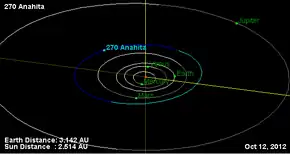 Orbital diagram | |
| Discovery | |
|---|---|
| Discovered by | C. H. F. Peters |
| Discovery date | 8 October 1887 |
| Designations | |
| (270) Anahita | |
| Pronunciation | /ɑːnəˈhiːtə, ænə-/ |
Named after | Anahita |
| A887 TA, 1926 VG | |
| Main belt | |
| Orbital characteristics[1] | |
| Epoch 31 July 2016 (JD 2457600.5) | |
| Uncertainty parameter 0 | |
| Observation arc | 118.40 yr (43246 d) |
| Aphelion | 2.5290 AU (378.33 Gm) |
| Perihelion | 1.8692 AU (279.63 Gm) |
| 2.1991 AU (328.98 Gm) | |
| Eccentricity | 0.15003 |
| 3.26 yr (1191.2 d) | |
| 219.26° | |
| 0° 18m 8.028s / day | |
| Inclination | 2.3667° |
| 254.390° | |
| 80.490° | |
| Physical characteristics | |
| Dimensions | 50.78±2.0 km[1] 50.78 km[2] |
| 15.06 h (0.628 d) | |
| 0.2166±0.018 | |
| S | |
| 8.75 | |
Anahita (minor planet designation: 270 Anahita) is a stony S-type Main belt asteroid. It was discovered by C. H. F. Peters on October 8, 1887, in Clinton, New York, and was named after the Avestan divinity Aredvi Sura Anahita.
In 2001, the asteroid was detected by radar from the Arecibo Observatory at a distance of 0.92 AU. The resulting data yielded an effective diameter of 47 ± 7 km.[3]
References
- 1 2 "270 Anahita". JPL Small-Body Database. NASA/Jet Propulsion Laboratory. Retrieved 11 May 2016.
- ↑ "The Supplemental IRAS Minor Planet Survey" Archived 7 May 2010 at the Wayback Machine Astron. J., 123, 1056-1085
- ↑ Magri, Christopher; et al. (January 2007), "A radar survey of main-belt asteroids: Arecibo observations of 55 objects during 1999 2003" (PDF), Icarus, 186 (1): 126–151, Bibcode:2007Icar..186..126M, doi:10.1016/j.icarus.2006.08.018, retrieved 14 April 2015.
External links
- The Asteroid Orbital Elements Database
- Minor Planet Discovery Circumstances
- Asteroid Lightcurve Data File
- 270 Anahita at AstDyS-2, Asteroids—Dynamic Site
- 270 Anahita at the JPL Small-Body Database
This article is issued from Wikipedia. The text is licensed under Creative Commons - Attribution - Sharealike. Additional terms may apply for the media files.